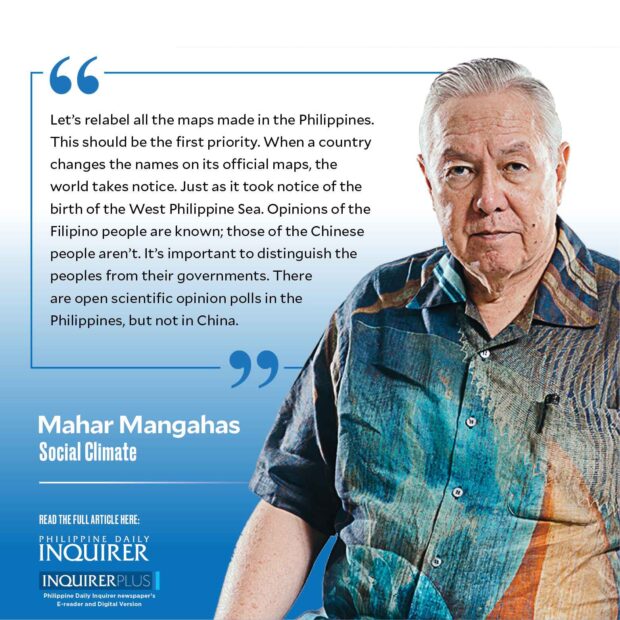Call it the Southeast Asia Sea
What is a sea? Nationalgeographic.org says: “A sea is a division of the ocean that is enclosed or partly enclosed by land.” This tells me that the enclosing land areas are what demarcates a specific sea.
What is the “South China Sea (SCS)”? Wikipedia.org says: “The South China Sea is a marginal sea of the Western Pacific Ocean. It is bounded in the north by the shores of South China, in the west by the Indochinese Peninsula, in the east by the islands of Taiwan and northwestern Philippines (mainly Luzon, Mindoro, and Palawan), and in the south by the Indonesian islands of Borneo, eastern Sumatra, and the Bangka Belitung Islands, encompassing an area of around 3,500,000 km².” This correctly recognizes that the Chinese portion of its land enclosure is only a small corner of Southeast Asia. I think the term “Indochinese Peninsula” is passé and appropriate only to colonial times—why include distant India as a reference at all? Why fail to itemize the Southeast Asian countries with adjacent coasts?
Article continues after this advertisementWikipedia cites the International Hydrographic Organization (IHO) as locating the SCS: south of the Chinese mainland; east of Vietnam; west of the Philippines: east of the Malay peninsula, up to the east entrance of the Strait of Singapore, and south of the Bintan and Batam islands; northeast of Sumatra; and north of the Bangka Belitung Islands and Borneo. It says that IHO, in 1986, recommended putting the southern limit of the SCS at the Natuna Sea (midway between peninsular Malaysia and Borneo).
Wikipedia gives names for the SCS in Chinese, Vietnamese, Thai, Japanese, Malay, Indonesian, Filipino, and Portuguese. It says that the Tagalog is “Dagat Timog Tsina,” and notes that the official designation of the Philippine government of its eastern parts is “West Philippine Sea.”
I humbly recommend calling this body of water the Southeast Asia Sea (SEAS), since it is, in fact, almost entirely enclosed by the countries of Southeast Asia. What is presently referred to as SCS is a body of water adjacent only to a small portion of southern China, in the vicinity of Hainan, China’s southernmost province.
Article continues after this advertisementI think that a line drawn between Hainan island and the northernmost part of the Philippines is the natural southern limit of the term SCS. It is also the natural northern limit of what can naturally be called the South East Asia Sea (SEAS). Calling it the SEAS does not make it belong to Southeast Asia; what it does is to definitely locate it within Southeast Asia.
Similarly, calling a body of water the SCS does not—and never did—make it belong to China. It does not—and never did—entitle the Chinese Coast Guard to patrol its coastal areas, as though it were an interior lake within China. In Tagalog, the SEAS would be Dagat Timog-Silangang Asya; let there be translations in all Filipino languages. Let’s adjust to the English abbreviation SEAS, and consciously stop abbreviating it as SCS.
Let’s relabel all the maps made in the Philippines. This should be the first priority. When a country changes the names on its official maps, the world takes notice. Just as it took notice of the birth of the West Philippine Sea.
Opinions of the Filipino people are known; those of the Chinese people aren’t. It’s important to distinguish the peoples from their governments. There are open scientific opinion polls in the Philippines, but not in China.
It is very clear that China is the country most distrusted—the net trust ratings are negative—by Filipinos. On the other hand, the United States is clearly the most trusted.
It’s not that China lacks the capacity to do high-quality opinion polls. The Chinese social scientists I have met are competent and well-meaning people. What they lack is the trust of the Chinese government to do research on their own.
There are consumer market research surveys in China, but they are closely inspected by the government. Woe to any research company if it accepts a commission to insert some political question in a survey.
The International Social Survey Program—in which Social Weather Stations is the Philippine member—lists two universities in China as members. But their requests for government approval of a topic are often denied.Information about the Philippine victory at the United Nations Convention on the Law of the Sea is hidden from the Chinese people. I learned from our late ambassador to China, Jose Santiago “Chito” Sta. Romana—my former student at the University of the Philippines—that Marites Vitug’s book, “Rock Solid: How the Philippines Won Its Maritime Case against China” (Ateneo de Manila University Press, 2018, 300 pages), is absent from bookstores in China. The Chinese people don’t read English books, he said; and there’s no translation.
Do China Coast Guard staff wonder, quietly of course, why their mission carries them so far away from the coasts of China? “Rock Solid” is a banned book for them.
Should Philippine Coast Guard ships have water cannons too? How about arming them from the Chinese embassy’s septic tank? I also thought of bagoong cannon and durian-cannon; but sayang such ammunition as food. Chinese people eat many things that others think strange; they’re not so different from Filipinos.
—————-
Contact: mahar.mangahas@sws.org.ph.
For comprehensive coverage, in-depth analysis, visit our special page for West Philippine Sea updates. Stay informed with articles, videos, and expert opinions.

















